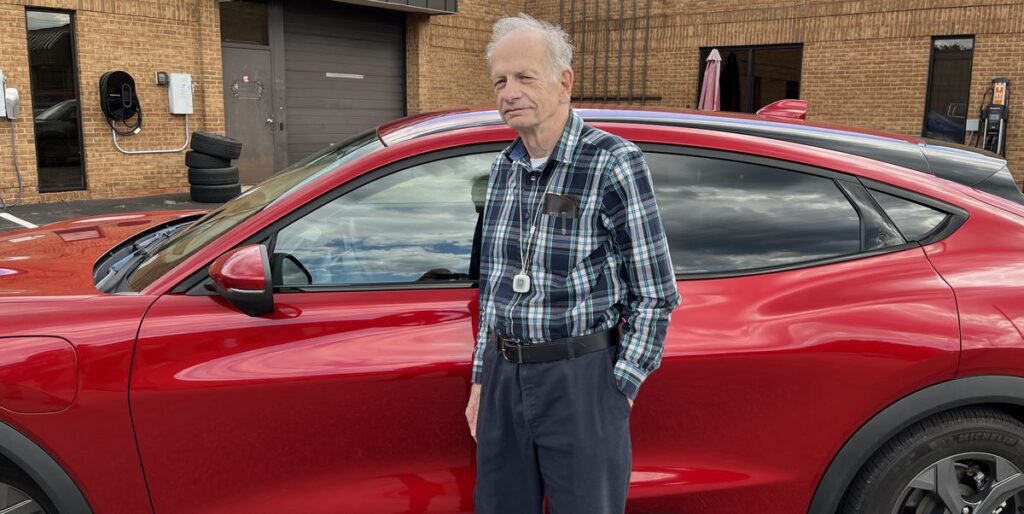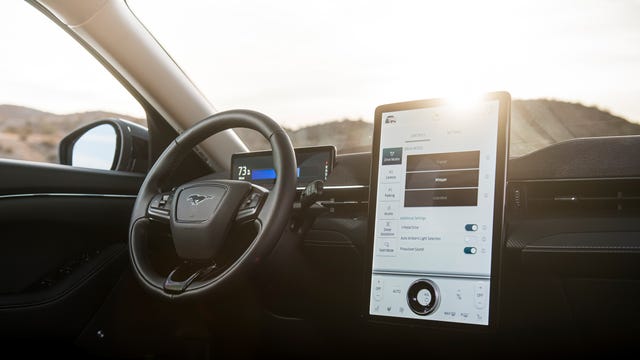89-Year-Old EV Enthusiast Gets the Ride of a Lifetime in a Ford Mustang Mach-E

The tall, reed-thin man walked cautiously into the Car and Driver offices, each step deliberate. He stopped to quietly scan his surroundings. Eighty-nine-year-old George Chartier had come to close one of the circles of his life: he was about to get his first ever ride in an electric car.
His son, Allen, was with him. Prior to the visit, he had explained to us, “He was always interested in electric cars, starting with a radio-controlled electric car he built in 1955. It is my hope to get him a ride in a [Ford Mustang] Mach-E.”
George Chartier|Car and Driver
Model EV Enthusiast
Growing up in Wisconsin, George Chartier loved model cars and the promise of electric propulsion in equal measure. He followed those interests in tandem throughout his life, first teaching himself how to build one-off, show-quality, 1/12-scale model concept cars from scratch using raw materials: basswood for the bodies and wispy strips of hand-formed copper that he chromed for the trim.
In his early twenties, he entered several of his scale-model cars in the Fisher Body Craftsman Guild contest, a national design competition sponsored by the General Motors body-building division for aspiring teenage car designers. His entries won first place statewide in 1953 and second statewide in 1954.

George Chartier|Car and Driver
But those were static display models. Chartier’s muse was electric propulsion. His next project, started in 1955, was far more adventuresome: a 1/12-scale, radio-controlled electric model car—the black coupe you see pictured here looking thoroughly realistic.
Like his Craftsman Guild cars, every piece on it was handmade, including a complete interior with tiny instrument gauge faces. Chartier also designed and built the one-off chassis that packages an electric motor, powered by D-cell batteries, and the radio-control hardware to make it run—plus a working suspension and steering system, headlights, turn signals, reverse lights, and a horn. It took some 3000 hours to build. As with his earlier models, he built it entirely on his own; RC-car kits didn’t exist in the mid-20th century.

George Chartier|Car and Driver
“I took that model to my job interview at Ford in 1962,” Chartier told me in his quiet voice. He was applying for a job as a clay modeler, hoping to become one of the artisans who sculpt and refine vehicle exteriors and interiors drawn by designers. During the interview, Chartier said, “I told them that I wanted to include sequential turn signals in the model, but there was no room for it; the mechanism was too bulky. They asked me if I had a patent on my idea, and I told them I didn’t.”
Chartier got hired on the spot, “and then a couple of years later my idea for sequential turn signals turned up on the Thunderbird.” Could Chartier have invented the sequential turn signal or at the very least given Ford the idea for it? Maybe, but he clearly anticipated its use.
Chartier remained a Ford clay modeler for 37 years, turning down managerial promotions so he could continue to pursue his love of model making by working on the full-size clays, which were a key part of the vehicle design process, throughout his career. Full-scale clays are still used today to confirm that a new vehicle’s lines look as good in real life, at full size, as they do on a computer screen.

Ford
Back to the Future
“This is really all electric?” Chartier asked as we circled the Mach-E charging in the Car and Driver test lot. He scrutinized the familiar triple taillights.
“It’s a Mustang, all right. You can tell by the taillights.” I flicked the LED turn signals on; they’re sequential, a modern-day version that first appeared in production on the 1964 Ford Thunderbird. Chartier looked at them, then back at us, eyebrows raised.
From the Mach-E’s passenger seat, Chartier quietly took in the large central infotainment screen and its multiple functions. “Nice and quiet,” he said as we rolled out of the office complex. Out on the street, I pressed deeply into the accelerator to give him a sense of the Mach-E’s instant torque. “You can’t feel it shift,” he said with a little chuckle, clearly knowing the Mach-E lacks a multi-speed transmission.

Allen T Chartier|Car and Driver
Why had he always been so taken by electric vehicles? As we whooshed down I-94 at 80 mph, he said, “I thought cars should be silent and smooth. Electric cars are—and they don’t smell.”
Thanks to today’s strict emissions controls and much-improved engine sealing technology, gasoline-powered cars run with antiseptic cleanliness. But the automotive world Chartier grew up in was a stinky one. If you love the smell of gasoline in the morning, buy a pre-1970 car, park it in your garage, and enjoy the perfume of unburned hydrocarbons, coolant, and engine oil. And those are the odors just evaporating off the car, let alone the exhaust fumes that it will expel when you fire it up.
We circled back to the office on surface streets so Chartier could observe what one-pedal driving was like and how normal an electric vehicle is to drive in everyday traffic. Chartier said: “As a clay modeler, I worked on everything that Ford made. I didn’t want to be a designer or manage people.
“Where do the recharge stations show on the map?”

Ford
Back in the C/D lot, Chartier climbed carefully out of the Mach-E to pose for photos. He grinned shyly for the camera. “This was an impossibility when I was a kid. Amazing batteries.”
Faded Memories
A couple of days later, Chartier’s son wrote about the experience. “I think that my dad is glad to see progress toward electric vehicles in general. I know that he was enjoying the ride and all the details you shared with him about the car at the time. He didn’t say much on the drive home about it. With his memory loss, he is very much ‘in the moment’ these days.”
Within a week, Chartier had forgotten all about his ride in the Mach-E, Allen said. But for a short time, at least, George Chartier got to see his dream of an electric-car future made real. Somewhere out there, we’d like to think, a dream shared by generations of car enthusiasts just like him finally came true.

Director, Buyer’s Guide
Rich Ceppos has evaluated automobiles and automotive technology during a career that has encompassed 10 years at General Motors, two stints at Car and Driver totaling 19 years, and thousands of miles logged in racing cars. He was in music school when he realized what he really wanted to do in life and, somehow, it’s worked out. In between his two C/D postings he served as executive editor of Automobile Magazine; was an executive vice president at Campbell Marketing & Communications; worked in GM’s product-development area; and became publisher of Autoweek. He has raced continuously since college, held SCCA and IMSA pro racing licenses, and has competed in the 24 Hours of Daytona. He currently ministers to a 1999 Miata and a 1965 Corvette convertible and appreciates that none of his younger colleagues have yet uttered “Okay, Boomer” when he tells one of his stories about the crazy old days at C/D.



